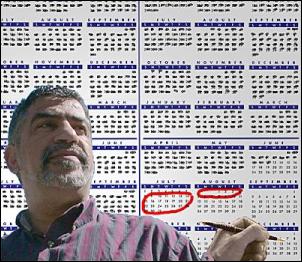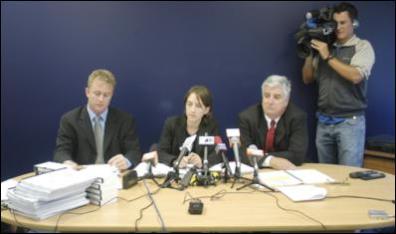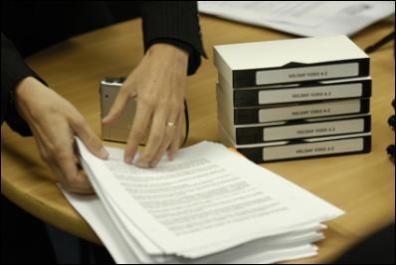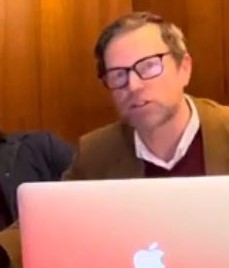Gordon Campbell: The Case Against
Zaoui, part one :

Former Listener journalist Gordon Campbell will be writing about the Zaoui review for Scoop.
The case against Ahmed Zaoui is split between the evidence already in the public domain, and the secret and classified items still under lock and key down at SIS headquarters. In a month or so, the review will go into recess for further negotiations on how much of the secret material can be released for direct scrutiny by the Zaoui defence team. On the British experience, this is – or should be – a long and tortuous process. The review will then reconvene at some unknown future date, for the special advocates to debate the bulk of the secret evidence.
One thing seems obvious : the SIS case today is far different to what it was in March 2003, when the risk security certificate against Zaoui was first issued by former SIS Director Richard Woods, endorsed by former Immigration Minister Lianne Dalziel and appealed soon afterwards to former SIS Inspector General Laurie Greig.
All of them have since departed the scene. Meanwhile, Zaoui’s ongoing existence in legal limbo continues to divide the country. Five and a half years after Zaoui first arrived here, there are still people – a few of them on Kiwiblog yesterday – without a clue about the bleak options faced by refugees and proud of it, man. Yes, Zaoui did come here on a false passport that he then ripped up, announced his true identity and claimed asylum.
Far from being illegal, such actions by refugees have been legal under international law for nearly half a century. For good reason. “A refugee whose departure from their country of origin is usually a flight,” UN Secretary–General Trygvie Lie said in 1950, “ is rarely in a position to comply with the requirements for legal entry [ie passport and visa] into the country of refuge.”
Why did the global community take that position in 1950, and why did it sign the UN Refugee Convention in 1951, a document that – together with the later Convention Against Torture - still has a major bearing on the Zaoui case ? Quite simply, it was because of the Holocaust. In the 1930s, Jews had found few welcoming places of refuge – and after the defeat of Nazism, the civilised world was trying to ensure that in future, people fleeing from persecution could find a place of refuge, and start their lives again in safety.
Obviously, the right to claim asylum does not deliver an automatic right of entry. In judging each case on its merits though, the courts have underlined that the use of false documentation should not penalise genuine refugees, which Zaoui has been declared to be by the New Zealand authorities. “Escape from persecution has long been characterised by subterfuge and false passports,” the senior British justice Simon Brown wrote in the Uxbridge case in 2001 : ”Self evidently, the UN provides immunity for genuine refugees whose quest for asylum reasonably involves them breaching the law.” Dictators, after all, are not renowned for issuing travel visas to political opponents, and waving them goodbye at the airport.
The other redneck response to any criticism of the glaring flaws in our security review process - that Zaoui can just leave and rejoin his family in Malaysia if he doesn’t like it - also wilfully misses the point. New Zealand has now issued a security certificate against Zaoui, severely limiting the few travel options he had. Malaysia was already unsafe – which is why he left in the first place – because the Algerian junta was lobbying them for Zaoui’s expulsion, back into their tender mercies.
The Refugee Status Appeals Authority – which is no soft touch and routinely declines 70 per cent or more of the appeals that come its way – has ruled that Zaoui faces a genuine risk of torture and execution if returned to Algeria. Denying the Jews a refuge 70 years ago was evil - and so are the calls for Zaoui to be kicked out now.

Back to the current SIS case.
The courts have confirmed that the SIS are entitled to update and add to the case they originally made in 2003. Fine, and fair enough on one level - lets get it right. It does mean though, that no genuine state mandate exists for the form that the SIS case against Zaoui has mutated into over time. The current Inspector-General Paul Neazor is hardly ‘reviewing’ the evidence – he is clapping his eyes on virgin territory, on material scrambled together in its final form only a couple of months ago. Neazor is reviewing the SIS case against Zaoui only in the sense that Columbus ‘reviewed’ America. So what may Neazor now be getting to grips with, behind the closed doors of the review ?
On July 11, 2006, Zaoui lawyer Deborah Manning gave RNZ’s Katherine Ryan the most recent update that we have. The SIS, Manning explained, had provided the review process with 55 files of information, and signalled that five more were coming. Of that 55, more than half – 30 of the SIS secret files – did not even mention Ahmed Zaoui by name at all, she said.
So much for the imperative for secrecy. The SIS secret files seem largely concerned with overviews of Islamic radicalism. This week’s review of the evidence was supposed to have started on August 7, 2006. It didn’t happen then, because the SIS failed to provide the evidence summaries ordered by the High Court two and a half years before. The main reason for the delay ? In April 2006, the SIS belatedly discovered material that had been sitting on its files for over three years. In other words, the delay - and related expense to the taxpayer – had once again been caused by the Crown’s own ineptitude. Too bad that the Zaoui defence witnesses overseas had already been notified and booked their tickets here. They, and everything else, were put on hold.
These delays were the rationale for the requests for Zaoui’s family – who are mandated UN refugees in their own right – to be allowed to join him here in the meantime and to leave with him again ultimately, if need be. Arguably, the incompetence behind the delays amounted to an abuse of process.
So the SIS have held all the cards, but have taken years to decide which ones to play. Certainly, the Zaoui defence witnesses couldn’t be briefed on the relevant issues until the Crown had finally decided WHAT its case actually was.
In reality, even before the courts gave it license to do so, the SIS had been shifting its ground. Way back in his October 7, 2003 interlocutory ruling, Greig had outlined the SIS case as conveyed to him by the SIS Director. Yet by the time the SIS issued their own summary of allegations only a few months later, at least one damning item cited by Greig - Zaoui’s actions since leaving Burkino Faso – had totally vanished from the allegations.
In January 2004, the infamous ‘casing’ video of Zaoui’s travels had also been a prominent part of the initial SIS summary of evidence. Due to the ridicule the SIS analysis received at the time – the video looked more like the work of the world’s worst photographer than the diary of a master spy – that video seems unlikely to be a major feature of the 2007 version of the evidence.

To bolster their case, the SIS asked MFAT in 2004 to solicit European governments for criticisms of the rulings made by the RSAA in Zaoui’s favour. This marked a particularly bizarre episode, as our diplomats invited foreigners to attack one of New Zealand’s most respected legal tribunals.
Over the past few months, the SIS case will have been tailored once again, this time to fit the test the Supreme Court set it in 2005. According to the Supremes, the SIS needs to prove that [Zaoui] must be thought on reasonable grounds to pose a serious threat to the security of New Zealand. The threat must be based on objectively reasonable grounds and the threatened harm must be substantial. That, on paper, is a very high hurdle. One that will hopefully need to rely on more than paranoid innuendo and a chain of ‘ six degrees of seperation’ links between Zaoui and someone who might know someone who might know someone who might have once met Bin Laden.
In that respect, a lot of typespace and energy has already been devoted to the convictions entered against Zaoui in France and Belgium. My own hunch is that those convictions will not form the heart of the SIS case. The convictions, as the careful and detailed RSAA dissection of them showed, can be faulted – and not only in terms of blatantly unfair process. The relatively minor penalties imposed by France and the fact that most of Zaoui’s co-defendants in the European cases have since been granted residency in various countries in Europe - the site of the crimes - means that the SIS would probably struggle to portray Zaoui’s prior convictions as a knockdown argument in favour of confirming the certificate in New Zealand.
After all, the SIS case against Zaoui has never alleged him to be a terrorist, or even a potential terrorist threat. The risk security certificate against him was not issued under section 73 of the Immigration Act – which concerns terrorists – but under the far more nebulous section 72, which offers fewer protections to the accused.
For all those reasons, I believe the more likely argument the SIS will try to run is that Zaoui is now, and always has been, a radical hardliner – a man they will allege has been consistently opposed to peace and reconciliation in Algeria. A man who opposed the ‘truce’ offered by the junta in the mid 1990s, just as he has misgivings now about the amnesty promoted by the Bouteflika government in Algeria today.
No matter that those same misgivings are also shared by Amnesty International and by Human Rights watch. To make its case, the SIS has to use its 30 files of general information about pan- Islamic radicalism and then shoe-horn Zaoui into the stereotype.
The beauty of this approach is that it is an entirely closed shop. The more the defence team offers evidence to the contrary, that Zaoui is and always has been a moderate democrat - the more this could only serve to confirm a default position about the man’s devious cunning, and the sway that he holds over his minions.
Casting Zaoui as the ‘radical cleric’ does seem the only way the SIS can meet the challenge posed by the Supreme Court. Charismatic. Devious. A sleeper agent perhaps for al-Qaeda ? Logically, the SIS has to go down this route. It can’t just recount Zaoui’s odyssey in Europe and Africa in the 1990s, and hope to win its case – not if the Inspector-General is even half awake. Tomorrow on Scoop, I’ll try to nail down the planks in the ‘Zaoui-as-hardliner’ argument, and suggest some of the glaring inconsistencies in it.
For starters, there is the testimony of Colonel Mohammed Samraoui, the Algerian junta’s senior intelligence officer in Europe during the mid 90s. Samraoui was the man tasked with monitoring the FIS leaders in exile and with issuing propaganda against them, from his base at the Algerian embassy in Bonn. When I contacted Samraoui in Germany in 2004, he was succinct in his judgment of Zaoui. He knew who the bad guys [in the FIS] were.
There were some, he said, but Zaoui wasn’t one of them. “I am sure of this because I was personally involved in the campaign launched against the Islamist leaders in Europe, of which Zaoui was one, in order to discredit them, and to obtain their extradition back to Algeria.” Not all the FIS were so peaceable, Samraoui added. “There were leaders and sympathisers of the FIS who did encourage armed action, and we know exactly who they are…But I can assure you that Zaoui had nothing to do with this, because he was in the political wing.”
Tomorrow : The SIS case, part II : Zaoui in the 1990s, and since.
 Disclosure : Gordon Campbell now
works as a media officer for the Green Party. He has been
writing about the Ahmed Zaoui case since 2003.
Disclosure : Gordon Campbell now
works as a media officer for the Green Party. He has been
writing about the Ahmed Zaoui case since 2003.
ENDS



 Keith Rankin: Remembering New Zealand's Missing Tragedy
Keith Rankin: Remembering New Zealand's Missing Tragedy Gordon Campbell: On Why The Regulatory Standards Bill Should Be Dumped
Gordon Campbell: On Why The Regulatory Standards Bill Should Be Dumped Martin LeFevre - Meditations: Psychedelics, Mystical Experiencing, And Organized Religion
Martin LeFevre - Meditations: Psychedelics, Mystical Experiencing, And Organized Religion Keith Rankin: Equity Rights - UBI, SUI, BUI, HUI, Or GUI?
Keith Rankin: Equity Rights - UBI, SUI, BUI, HUI, Or GUI? Binoy Kampmark: The Inevitable Souring - Elon Musk Falls Out With Donald Trump
Binoy Kampmark: The Inevitable Souring - Elon Musk Falls Out With Donald Trump Ian Powell: Postscript On Ethnic Cleansing, Genocide And New Zealand Recognition Of Palestine
Ian Powell: Postscript On Ethnic Cleansing, Genocide And New Zealand Recognition Of Palestine